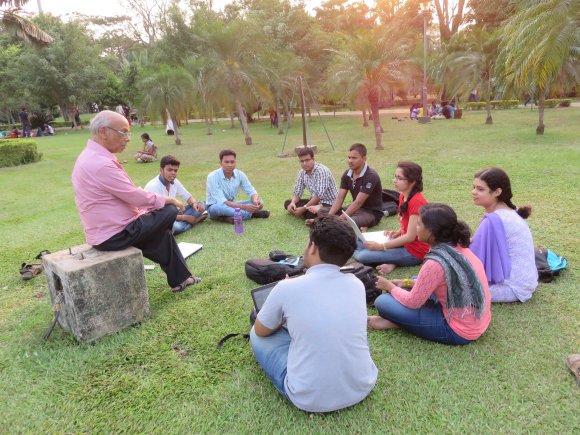
Tungi is an ancient practice in Odia culture where participants share knowledge of the scriptures. The Odia Wikipedia’s WikiTungi is an attempt to capture that spirit to help build city-based offline Wikipedia communities that help Wikimedians within a city meet and learn from their shared experiences.
For over a year, Tungi meetups and events have been organized by volunteers. The activities included a self-sustaining training program cycle wherein community members train new contributors who will in turn be responsible for training the next generation of editors.
Two Indian cities, Puri and Bhubaneswar, have hosted WikiTungi events so far. 22 experienced Wikipedians helped train both existing and new Wikipedia users.
In the bi-monthly meetups in Puri and the monthly ones held in Bhubaneswar, Wikimedians meet to share their updates and discuss any emerging queries or issues around the projects. Tungi also helps promote the Wikimedia movement in the area by encouraging individuals to participate.
The new activity helped the community make improvements in several areas:
Video by Dorajagannath8, CC BY-SA 4.0. Users not able to watch the native webm above can see it on Wikimedia Commons.
- Rath Yatra GLAM: Wikimedians in Puri documented the 22-day Ratha Yatra festival (Ratha Jatra), also known as the “chariot festival.” The community felt a need to improve on photo and video documentation of this ritual on an open platform like Wikipedia, so they organized Rath Yatra GLAM—the first GLAM activity by Odia Wikipedians. Wikimedians spent over three weeks documenting the important parts of the festival at Ratha Khala, where the chariots are made. The project will take a full year to complete and will provide one of the largest open knowledge resources available on Jagannath culture. Towards that effort, a month long edit-a-thon was organized where participants improved and created 60 articles on the Odia Wikipedia.
- Image-a-thon: The image-a-thon was a project to illustrate Odia Wikipedia articles that are missing photos. Phase one of the project was held in Puri, where participants took and uploaded photos of Puri City to Wikimedia Commons, then added them to Wikipedia articles. Seven Wikipedians participated with 150 photos uploaded.
- Article placeholder extension: The Odia Wikipedia was one of the first languages to host the article placeholder extension. The extension helps automatically generate content pages on Wikimedia projects displaying data from Wikidata. Since August 2016, a series of Wikidata label translation activities have been carried out in collaboration with Wikimedians from Puri to help with this project.
- Odia Wikisource’s second-anniversary conference: On January 2017, the Odia Wikimedia community organized the second anniversary celebration of Odia Wikisource. Thirty Wikimedians attended the event where they learned about the book digitization process, proofreading, and OTRS support. Wikipedian Jnanaranjan Sahu helped with the funding process.
- Sambad’s 100 Women Editathon: Inspired by the BBC’s 100 Women editathon, the Odia Wikipedia’s Bhubaneswar WikiTungi community is organizing a 100 Women editathon in collaboration with the Sambad newspaper. The editathon will be held at the Sambad office, Bhubaneswar on 18 and 19 March 2017. Participants will be editing and improving 100 articles about women of Odisha. Utkal University’s Department of Women’s Studies and Sambad will support the event by providing the participants with resources to create or improve the profiles.
- Future plans
- Planning to send postcards as souvenirs to the participants of the global community for the online sessions.
- Publishing meeting minutes to the community.
- Sharing experiences with the global Wikipedia community by inviting Wikipedians to video calls and exchanging best practices.
In brief
Telugu Wikipedia’s attempt to improve machine-translated articles: In 2008, Google started the “Indic Google Translate Project” on Indic language Wikipedias to promote Wikipedia’s content with the help of machine translation tools. The project continued through 2011. Telugu Wikipedia was one of the languages that collaborated with the program, which helped translate articles from the English Wikipedia into the Telugu Wikipedia using these tools.Despite its goal to improve Indic language Wikipedias, to some, the project wasn’t considered of great help, as the pages had many incomprehensible parts, redlinks, template issues, broken file links, etc. The Telugu Wikipedia community is now working on a project to improve the quality of the Google-translated articles.
Despite its goal to improve Indic language Wikipedias, to some, the project wasn’t considered of great help, as the pages had many incomprehensible parts, redlinks, template issues, broken file links, etc. The Telugu Wikipedia community is now working on a project to improve the quality of the Google-translated articles.
The community is teaching Wikipedians how to use the Wikipedia translation tool to rewrite the articles more efficiently. A video tutorial has been created for that purpose. As some Wikipedians have noted that the Google Translation Project created many unnecessary and low-quality articles, a framework has been developed to prioritize which articles should be rewritten, improved, or deleted during edit-a-thons.
International Mother Language Day in Bangladesh: On 21 February 2017, Wikimedia Bangladesh hosted gatherings in five divisions of Bangladesh (Dhaka, Chittagong, Rajshahi, Khulna and Rangpur) to celebrate International Mother Language Day. Wikipedians of Bangladesh were standing in a public place with banners asking passersby to contribute to the Bengali Wikipedia and other Wikimedia projects. The day has a special meaning to Bangladeshis, as UNESCO established 21 February as International Mother Language Day as a tribute to those who were killed in the 21 February 1952 Bengali Language Movement demonstration and the ethno-linguistic rights of people around the world. (item courtesy of Nahid Sultan, Wikimedia Bangladesh)
The First gathering was held back in 2007 in Dhaka. Since then, Bangladeshi Wikimedians have been doing it annually. More images can be found on Wikimedia Commons.
Sailesh Patnaik, Community Advocate
CIS-A2K

Can you help us translate this article?
In order for this article to reach as many people as possible we would like your help. Can you translate this article to get the message out?
Start translation